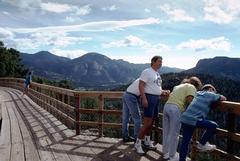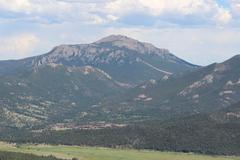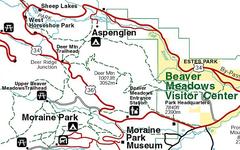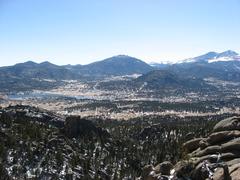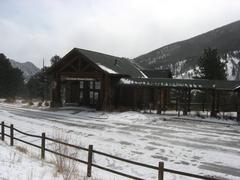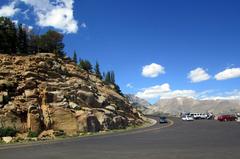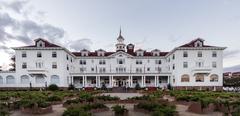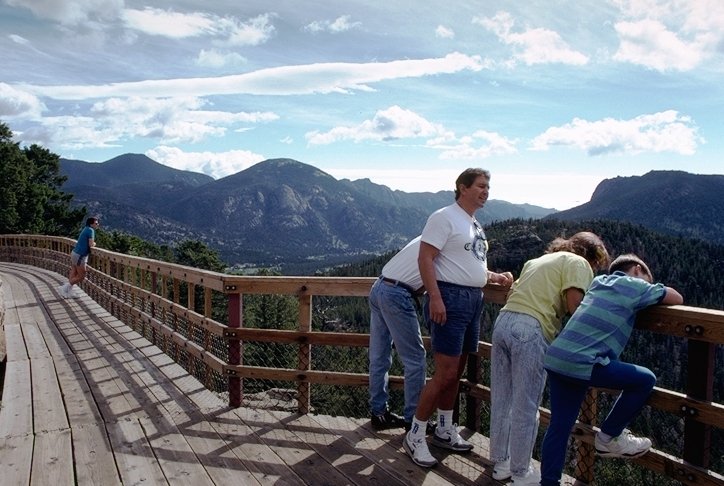
Many Parks Curve: Visiting Hours, Tickets, and Complete Guide to Estes Park Historical Sites
Date: 14/06/2025
Introduction
Many Parks Curve Overlook is a celebrated scenic viewpoint on Trail Ridge Road in Rocky Mountain National Park, just west of Estes Park, Colorado. This iconic site is renowned for its sweeping vistas of glacially carved valleys—locally known as “parks”—including Moraine Park, Horseshoe Park, and Beaver Meadows. Positioned at approximately 9,620 feet, the overlook provides a unique vantage point to appreciate the park’s alpine landscapes, diverse ecosystems, and rich cultural history.
This guide offers detailed information on visiting hours, ticketing and permits, accessibility, travel tips, and nearby historical and cultural attractions in Estes Park. You’ll also learn about the overlook’s geological significance, ecological diversity, and the best times to visit.
Table of Contents
- Introduction
- Visiting Many Parks Curve: Hours, Tickets, and Accessibility
- Getting There and Travel Tips
- Nearby Attractions and Historical Sites in Estes Park
- Guided Tours and Photography Spots
- Historical Overview of Many Parks Curve and Estes Park Region
- Modern-Day Interpretation and Preservation
- Frequently Asked Questions (FAQ)
- Plan Your Visit and Stay Connected
- Geological Formation and Landscape Features
- Ecological Diversity and Natural Significance
- Practical Visitor Information: Visiting Hours, Tickets, and Travel Tips
- Panoramic Vistas and Interpretive Value
- Seasonal Changes and Natural Phenomena
- Conservation and Visitor Impact
- Many Parks Curve Experience: Location, Significance, and Seasonal Tips
- Visitor Tips for a Memorable Visit
- Practical Information
- Estes Park Attractions and Nearby Scenic Stops
- FAQs About Many Parks Curve
- Enhance Your Visit with Audiala
- Additional Resources
- Summary and References
Visiting Many Parks Curve: Hours, Tickets, and Accessibility
Visiting Hours
Many Parks Curve is accessible seasonally, typically from late May through mid-October, corresponding to the opening of Trail Ridge Road. The overlook is open during daylight hours; sunrise and sunset are especially recommended for dramatic lighting and minimal crowds.
Tickets and Entry Fees
All visitors must pay the standard Rocky Mountain National Park entrance fee. There is no additional charge for Many Parks Curve itself. During peak months (late May to mid-October), a timed-entry permit is required for all vehicles entering the park and accessing Trail Ridge Road (NPS Timed Entry Permit System). Secure permits online in advance, as they often sell out.
Accessibility
The overlook features a paved, wheelchair-accessible path from the parking area to the observation deck. The grade is gentle enough for strollers and mobility aids, though some mild inclines exist. Parking is limited and fills quickly during peak hours (10:00 a.m. to 3:00 p.m.), so early arrival is recommended. There are no restrooms at the overlook; nearest facilities are at Beaver Meadows and Alpine Visitor Centers.
Getting There and Travel Tips
- Location: Trail Ridge Road (U.S. Highway 34), about 7–9 miles west of Estes Park via the Beaver Meadows Entrance (roadtravelamerica.com).
- Access: Private vehicles are required; Estes Park shuttles do not reach the overlook.
- Travel Tips:
- Check road conditions and status before visiting.
- Dress in layers; weather at high elevation changes rapidly.
- Bring water, snacks, and a park map—cell service is unreliable.
- Plan visits in the early morning or late afternoon for better parking and light.
Nearby Attractions and Historical Sites in Estes Park
- Estes Park Museum: Explores local history and Indigenous cultures.
- Stanley Hotel: Historic hotel famous for its architecture and literary connection.
- Moraine Park Discovery Center: Offers exhibits on geology and wildlife.
- Alpine Visitor Center: Highest visitor center in the park, with exhibits and a café.
These sites enhance your understanding of the region’s past and complement the natural beauty of Many Parks Curve.
Guided Tours and Photography Spots
Ranger-led programs and educational tours often include Many Parks Curve, particularly during the summer. For photographers, the overlook is ideal during sunrise and sunset, providing panoramic shots of glacial valleys and Longs Peak. Bring a tripod for low-light conditions and enjoy seasonal highlights like wildflowers (June–July) and fall colors (late September).
Historical Overview of Many Parks Curve and Estes Park Region
Indigenous Presence and Early Human Activity
The area has been inhabited for at least 12,000 years, with the Ute and Arapaho tribes establishing seasonal migration routes through these valleys.
Euro-American Exploration and Settlement
Early explorers such as Major Stephen H. Long and settlers like Joel Estes contributed to the growth of the Estes Park community and set the stage for modern tourism.
Conservation and National Park Creation
Rocky Mountain National Park was established in 1915, largely due to the advocacy of conservationists like Enos Mills. The inclusion of Many Parks Curve within park boundaries ensured its preservation for future generations.
Trail Ridge Road and Many Parks Curve
Completed in 1932, Trail Ridge Road is the highest continuous paved road in North America and was engineered to showcase the park’s diverse landscapes, with Many Parks Curve as a key scenic stop (AllEstesPark).
Modern-Day Interpretation and Preservation
Today, the National Park Service maintains Many Parks Curve with interpretive signage, educational programs, and conservation initiatives. Collaboration with Indigenous communities and historians enriches the visitor experience.
Frequently Asked Questions (FAQ)
Q: Do I need a ticket to visit Many Parks Curve?
A: The standard park entrance fee applies. During peak season, a timed-entry permit is also required.
Q: What are the best times to visit?
A: Early morning and late afternoon for best light, wildlife viewing, and fewer crowds.
Q: Is Many Parks Curve accessible for people with disabilities?
A: Yes, the overlook is accessible via a paved path from the parking lot.
Q: Are guided tours available?
A: Ranger-led and educational tours are available seasonally. Check the NPS schedule.
Q: What wildlife might I see?
A: Elk, mule deer, moose, bighorn sheep, and various birds—especially in adjacent meadows.
Geological Formation and Landscape Features
Tectonic Origins and Rock Composition
The region’s granite and gneiss date back over 1.4 billion years. Tectonic uplift during the Laramide Orogeny created the dramatic peaks and ridges visible today (5280 Magazine).
Glacial Sculpting and Valley Formation
Glacial activity during the Pleistocene Epoch carved the broad U-shaped valleys visible from the overlook. Features like the Alluvial Fan demonstrate ongoing geological processes (Intrepid Scout).
Elevation and Tree Line
At 9,620 feet, Many Parks Curve marks the transition from subalpine forest to alpine tundra. This is the ecological “tree line,” above which trees cannot survive (That Colorado Couple).
Ecological Diversity and Natural Significance
Subalpine and Alpine Ecosystems
The area supports Engelmann spruce, subalpine fir, lodgepole pine, and above the tree line, hardy tundra plants. Wildlife includes elk, mule deer, black bears, pikas, and marmots (Estes Park, Full Suitcase).
Hydrology and Wetlands
Nearby wetlands, fed by the Big Thompson River, support a variety of amphibians, waterfowl, and the greenback cutthroat trout (Intrepid Scout).
Practical Visitor Information
Visiting Hours and Timed Entry Permits
Trail Ridge Road and Many Parks Curve are accessible from late May to mid-October, with access regulated by a timed-entry permit system during peak periods (Earth Trekkers).
Tickets and Permits
Obtain permits and park passes online in advance (NPS Timed Entry).
Accessibility and Transportation
Accessible by car; no direct shuttle service. The path to the overlook is paved and suitable for wheelchairs.
Travel Tips
- Arrive early for parking.
- Hydrate and acclimate to elevation.
- Dress in layers.
- Follow wildlife viewing rules and Leave No Trace.
Guided Tours and Special Events
Check for ranger-led programs and seasonal tours (NPS events calendar).
Nearby Attractions
- Rainbow Curve
- Alpine Visitor Center
- Estes Park town
Panoramic Vistas and Interpretive Value
Many Parks Curve offers views of Moraine Park, Horseshoe Park, Beaver Meadows, Longs Peak, and the Mummy Range (Triptins). Interpretive signs enhance understanding of the landscape.
Seasonal Changes and Natural Phenomena
- Wildflowers: Peak bloom in June–July.
- Fall Colors: Late September is prime for golden aspens.
- Weather: Afternoon thunderstorms common in summer; snow possible in spring and fall.
Conservation and Visitor Impact
The National Park Service manages visitor access to protect sensitive alpine environments. Stay on trails, observe wildlife from a distance, and avoid peak times when possible.
Many Parks Curve Experience: Location, Significance, and Seasonal Tips
Many Parks Curve is one of the first major overlooks west of Estes Park on Trail Ridge Road. It is a critical point for appreciating the transition between montane and subalpine ecosystems and serves as a major interpretive site for both geology and human history (Lost With Lydia).
Visitor Tips for a Memorable Visit
- Reserve tickets early, especially for peak season.
- Dress for variable weather and high UV exposure.
- Bring water, snacks, and a camera.
- Visit at sunrise or sunset for the best light and wildlife activity.
- Respect park regulations and wildlife safety guidelines.
Practical Information
- Parking: Limited; fills fast during peak hours.
- Restrooms: Nearest are at visitor centers.
- Wheelchair Access: Paved path from parking to overlook.
- Pets: Not allowed at overlooks or on trails.
- Emergency: Dial 911; rangers patrol the area.
Estes Park Attractions and Nearby Scenic Stops
- Rainbow Curve: Frequent rainbows and dramatic weather.
- Forest Canyon Overlook
- Alpine Visitor Center: Highest point on Trail Ridge Road.
- Estes Park Museum
- Stanley Hotel
- Moraine Park Discovery Center (chasingadvntr.com)
Enhance Your Visit with Audiala
Download the Audiala mobile app for immersive audio tours, interactive maps, and insider tips. Stay updated by following Audiala on social media and consult the app for the latest road and weather conditions.
Additional Resources
- Rocky Mountain National Park Official Website
- Estes Park Visitor Center
- Trail Ridge Road Status Updates
- Lost With Lydia: Rocky Mountain National Park Itinerary
- NPS Timed Entry Permit System
Summary of Key Points
Many Parks Curve Overlook is a can’t-miss destination for its panoramic vistas, ecological diversity, and historical context. Secure entrance passes and timed-entry permits in advance, arrive early for best parking and light, and respect the fragile alpine environment. Enhance your trip by exploring nearby Estes Park historical sites and using the Audiala app for guidance.
For the most current information, consult the Rocky Mountain National Park website and Estes Park visitor resources.
Sources
- Lost With Lydia: Rocky Mountain National Park Itinerary
- National Park Service: Timed Entry Permit System
- National Park Service: Rocky Mountain National Park
- Estes Park Visitor Center: Visitor Guide
- Trail Ridge Road Status Updates
- 5280 Magazine
- Intrepid Scout: Best Stops on Trail Ridge Road
- That Colorado Couple: Trail Ridge Road
- Estes Park
- Full Suitcase: Rocky Mountain National Park Itinerary
- Earth Trekkers: Rocky Mountain National Park Itinerary
- Triptins: Trail Ridge Road
- chasingadvntr.com: Estes Park Things To Do
- roadtravelamerica.com: Estes Park Colorado Travel
- visitestespark.com: Visitor Guide
